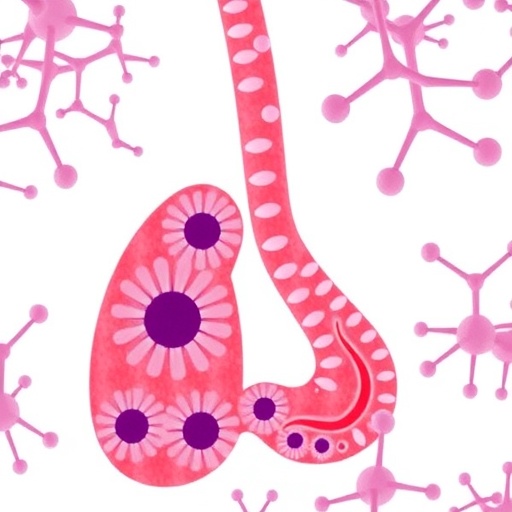
Esophageal cancer remains one of the most lethal malignancies worldwide, primarily due to its aggressive nature and the challenges associated with early diagnosis and effective treatment. As research seeks to unravel the intricate biological landscape of this disease, a recent multi-omics study has shed compelling light on the immune landscape that governs esophageal cancer progression and treatment response. By harnessing large-scale genomic data and sophisticated computational methods, scientists have uncovered novel immune subtypes within esophageal tumors, along with promising tumor antigen targets that could revolutionize future immunotherapeutic approaches.
Central to this investigation was the integration of the extensive datasets from The Cancer Genome Atlas (TCGA), which provided a robust platform for deep immune profiling. The researchers employed cutting-edge clustering algorithms to systematically classify esophageal cancer samples based on immune-related gene expression patterns. This analytical rigor led to the identification of three distinct immune subtypes, each characterized by unique immune cell infiltrates and signaling pathways. These subtypes demonstrate the heterogeneous nature of esophageal cancer and underscore the complex interactions between tumor cells and the host immune system.
The delineation of these immune subtypes offers profound implications for precision medicine. By mapping the specific immune landscape in esophageal tumors, clinicians and scientists can better predict how patients might respond to innovative treatments such as mRNA-based vaccines. Unlike traditional therapies, these vaccines stimulate the patient’s immune system to recognize and attack cancer cells by targeting tumor-specific antigens. Understanding the tumor microenvironment’s nuances is therefore critical in tailoring such vaccines to achieve maximal efficacy.
.adsslot_lgzb3OYJtW{width:728px !important;height:90px !important;}
@media(max-width:1199px){ .adsslot_lgzb3OYJtW{width:468px !important;height:60px !important;}
}
@media(max-width:767px){ .adsslot_lgzb3OYJtW{width:320px !important;height:50px !important;}
}
ADVERTISEMENT
Integral to the study’s success was the meticulous identification of tumor antigens that are both overexpressed and commonly mutated in esophageal cancer. Through comprehensive survival analyses, six genes emerged as key players, demonstrating a strong correlation with poor patient prognosis and heightened infiltration of antigen-presenting cells within the tumor milieu. These findings highlight the dual role these antigens play not only in tumor progression but also in shaping immune responses, making them attractive candidates for targeted vaccines.
Among the identified antigens, the genes BTN2A1, MICA, and HHLA2 stand out due to their stability and reproducibility across diverse sample sets. BTN2A1, a member of the butyrophilin family, is implicated in modulating immune cell activation, influencing both the innate and adaptive arms of immunity. MICA is known for its role in stress-induced immune signaling, often acting as a ligand for activating natural killer cells and certain T cells. Meanwhile, HHLA2 is a checkpoint molecule with complex functions that can either stimulate or inhibit immune responses based on context. Their combined presence and behavior suggest that future mRNA vaccines could be designed to harness these targets, offering a new avenue for battling esophageal malignancies.
The study also leveraged advanced weighted gene coexpression network analysis (WGCNA) to unravel the relationships between the identified antigens and broader gene expression modules. This network-centric approach allowed the pinpointing of hub genes that not only govern tumor biology but also influence immune interactions. By understanding these hub genes, researchers can better comprehend the molecular circuits that contribute to immune evasion, a hallmark of many cancers including esophageal carcinoma.
An intriguing aspect of the research is the exploration of immune evasion mechanisms shaped by autoimmune-related pathways. While immune surveillance often serves as a defense against cancer development, tumors can exploit aspects of autoimmunity to bypass detection and destruction. The comprehensive immunogenomic analysis provided insights into how esophageal tumors manipulate immune checkpoints and antigen presentation machinery to escape immune attack. Targeting these pathways could enhance vaccine efficacy and restore effective immune control.
The immune heterogeneity elucidated by this study redefines how we perceive esophageal cancer treatment landscapes. It emphasizes the necessity of moving beyond one-size-fits-all therapies toward more individualized approaches that consider the patient’s unique tumor immune microenvironment. By categorizing tumors into immune subtypes, patients can be stratified for more suitable immunotherapies, potentially improving survival rates and minimizing adverse effects.
Moreover, this investigation addresses a critical knowledge gap by tying immune subtypes to clinical outcomes. Patients classified under subtypes with distinct immune signatures demonstrated variable prognoses, hinting that the immune contexture is not merely academic but has tangible prognostic value. This understanding could refine clinical decision-making, enabling oncologists to identify patients who are likely to benefit from vaccine-based interventions.
Technological innovations underpinning this study—such as graph learning-based dimensionality reduction—enhance the resolution at which scientists decipher complex immune datasets. These computational methodologies facilitate visualization and interpretation of high-dimensional data, revealing subtle patterns that conventional analyses might overlook. Such tools are indispensable in immuno-oncology research, where the interplay between myriad cellular and molecular factors dictates therapeutic success.
In conclusion, the convergence of immunogenomics and computational biology in this research offers a transformative glimpse into esophageal cancer’s immune microenvironment. By identifying stable immune subtypes and novel tumor antigens, the study paves the way for the development of next-generation mRNA vaccines poised to improve patient outcomes. As immunotherapy continues to evolve, such multidimensional analyses will be instrumental in guiding innovative strategies tailored to combat the immunological complexity of cancer.
Subject of Research: Human tissue samples
Article Title: 10.21037/jtd-2025-233
News Publication Date: 28-May-2025
Keywords: Esophageal cancer; immune subtype; survival analysis; mRNA vaccine
Tags: biological landscape of esophageal cancerclustering algorithms in cancer researchesophageal cancer immune subtypesesophageal cancer treatment responsegenomic data analysis in oncologyimmune cell infiltrates in tumorsimmune profiling The Cancer Genome Atlasimmunotherapy advancements esophageal cancermulti-omics study esophageal cancernovel immunotherapeutic approachesprecision medicine in cancer treatmenttumor antigen identification





